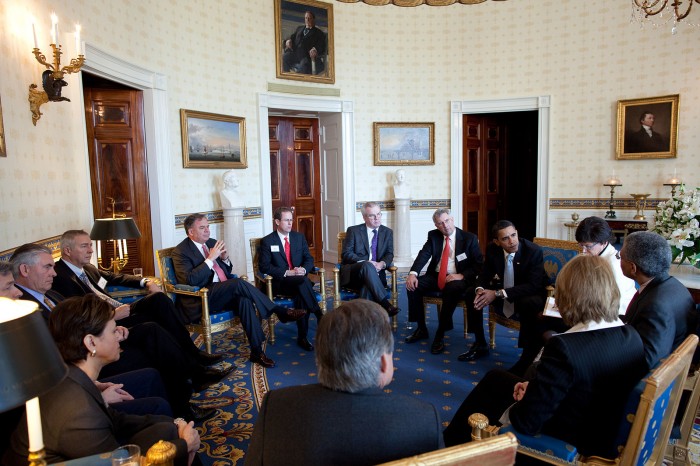Before I was a management consultant, I had an embarrassingly one-dimensional view of CEOs.
Because my only dealings with them were via the media, I thought of them as money-hungry tyrants who derived pleasure from doling out misery to others (think Montgomery Burns or Miranda Priestly from “The Devil Wears Prada”).
It wasn’t until I became a corporate psychologist and regularly met with senior executives that I appreciated the immense pressure they were under, and the sense of responsibility most of them felt for their employees. I learned about their hopes, dreams and insecurities.
In other words, I started to see them as people.
I’m not the only one who has gotten sucked into seeing others as objects. I have spoken to medical professionals who have unwittingly become desensitized to patients, seeing them more as “cases” than frightened individuals in need.
I have seen employees afraid to speak to their bosses about personal issues because they had decided it was impossible for a senior person to relate to their situation. I have also felt like an object when going to the DMV, receiving a condescending reply in response to an innocent question.
As humans, we are prone to putting people into categories. It gives us a mental shorthand that makes navigating our complex environments easier.
Seeing others as individuals requires mindfulness and a continued awareness of our commonalities.
Considering their individuality takes more effort. However, this extra expenditure of energy is worth it, for a number of reasons.
1. It Reduces Prejudice.
Studies have shown that we often engage in prejudiced behavior, without being conscious of it. For example, people rate the quality of a scientific paper differently depending on whether they think it was written by a man or a woman. Similarly, if people are exposed to two job candidates with the same resume, the individual with the more typically Anglo-Saxon name tends to have a greater chance of consideration compared to someone whose name is judged to be African-American.
By being intentional about recognizing the humanity in others, we can better combat tendencies we might have toward stereotyping. Research has shown that when we focus on the commonalities we have with others, we are more likely to see them as part of our in-group, and as a result, we are less likely to engage in prejudiced behaviors. For example, I have seen many seemingly strange bedfellows exchange high-fives and become chummy with one another based on shared allegiance to a team.
Interestingly, when we are in a positive mood, we are less likely to perceive members of other groups as homogeneous (i.e., the, “They-all-look-alike” phenomenon). So, by working on our own happiness, we will be less likely to categorize others.
These efforts are all important, as reducing prejudice contributes to greater teamwork and fairness in the workplace.
2. It Makes Us More Compassionate.
Lovingkindness meditation is a staple of many compassion-training procedures. In this practice, the meditator reflects on herself and others (including friends, neutral parties, difficult people and all of humanity) in sequence. While focusing on each individual or group, the meditator strives to appreciate the others’ humanity, by truly wishing each person in question happiness, health, freedom from suffering and peace.
This practice has been shown to increase feelings of compassion, which in turn, have been linked to greater happiness and increased helping behaviors.
The benefits are also contagious—when we witness someone doing something positive for someone else, we are more likely to experience a feeling of elevation, which is linked to greater commitment and loyalty, and an increased likelihood of helping colleagues.
3. It Allows Us to Provide Better Service.
Dr. Yehonatan Turner, a radiologist, recognized the problem of seeing people as objects. His work involved spending his time hunched over a monitor examining x-rays, as opposed to interacting with patients. He suggested that the patients’ files have a digital image of each individual attached to them, so he could have more of a feeling of connection with them.
This turned into a study, which resulted in the finding that radiologists who had pictures attached to their files wrote more detailed reports that included more incidental findings and recommendations compared to those who followed the standard protocol.
The doctors reported that this simple intervention caused them to feel closer to the patients.
In this instance, not considering others’ humanity could be a life or death matter; in other lower-stakes situations, seeing others as individuals could improve service by making us more likely to make an effort to connect with them and help them to the best of our ability.
4. It Increases Confidence.
At work, there are plenty of opportunities to be intimidated—presenting to a large group, trying to influence a senior leader, or dealing with someone who has a difficult personality are potential causes of trepidation.
I have found, however, that thinking about the humanity of the person(s) we are dealing with can help to combat feelings of apprehension. Remembering that we are all just human beings who care about our loved ones and want to matter to others, allows us to see the person as a someone who shares more in common with us than not.
A somewhat quirky visual that works for me when I need a confidence boost is to remember that the other person gets home from work, he probably changes into ratty sweatpants like I do. Whether or not it’s literally true (they could be non-ratty Chanel sweatpants), it helps me to see that person in a different context, and see that they are more like me. This enables me to approach the situation with a greater sense of self-assurance, focused on our commonalities as opposed to our differences.
This quote by Nobel Peace Prize winner, Desmond Tutu, sums it up:
“My humanity is bound up in yours, for we can only be human together.”
Let’s keep that in mind as we strive to make the workplace—and the world—a better place.
Love elephant and want to go steady?
Sign up for our (curated) daily and weekly newsletters!
Apprentice Editor: Kim Haas / Editor: Travis May
Photo: Wiki Commons







Read 3 comments and reply